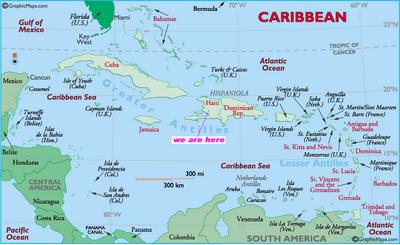First island hop - Haiti
>> Monday, September 12, 2005

We are on a tour in the Caribbean. Remember!? Well anyway I read two related books already and figure I'd give you a review.
Well our first island hop is Haiti.
The first thing I did was google Haiti and get find out some VERY basic facts about it. Unfortunately besides its location, and that there is something turbulent going on with its politics I didn't know any real details. The CIA World Fact Book, who I think are geniuses in summarization techniques, gives you a quick glimpse.
The native Arawak Amerindians - who inhabited the island of Hispaniola when it
was discovered by Columbus in 1492 - were virtually annihilated by Spanish
settlers within 25 years. In the early 17th century, the French established a
presence on Hispaniola, and in 1697, Spain ceded to the French the western third
of the island - Haiti.The French colony, based on forestry and sugar-related industries, became one of the wealthiest in the Caribbean, but only through the heavy importation of African slaves and considerable environmental degradation.
In the late 18th century, Haiti's nearly half million slaves revolted under
Toussaint L'OUVERTURE and after a prolonged struggle, became the first black
republic to declare its independence in 1804. Haiti has been plagued by
political violence for most of its history. It is the poorest country in the Western Hemisphere.The first book I read was "The Dew Breaker" by Edwidge Danticat. Why I chose it? Well honestly, I saw it on the best sellers table in the bookstore and since I'm all
tuned into Caribbean stuff I grabbed it. Book was awesome. Its a contemporary story but looks into Haiti and its history by giving us glimpses into lives of a number of interconnected characters...
This book touches upon Haiti's politics and how many of its leaders have been exiled. How even though it is a democratic state, force is still being used to scare people into following.
Even though Haiti was the first slave state to gain its independence, to this day many children still act as if indentured servants when their poor families give them away to "have a better life" with richer families in the cities. They're called Restaveks.
The author has written a number of other books related to Haiti. What's also curious is that she is young, having published her fist book at 26 and has grown up in America.
I personally find it the biggest high to learn about people and their culture that is completely different from my own, only to find out how VERY similar we all really are!! (I may almost be able to skip on coffee that day.)



0 comments:
Post a Comment